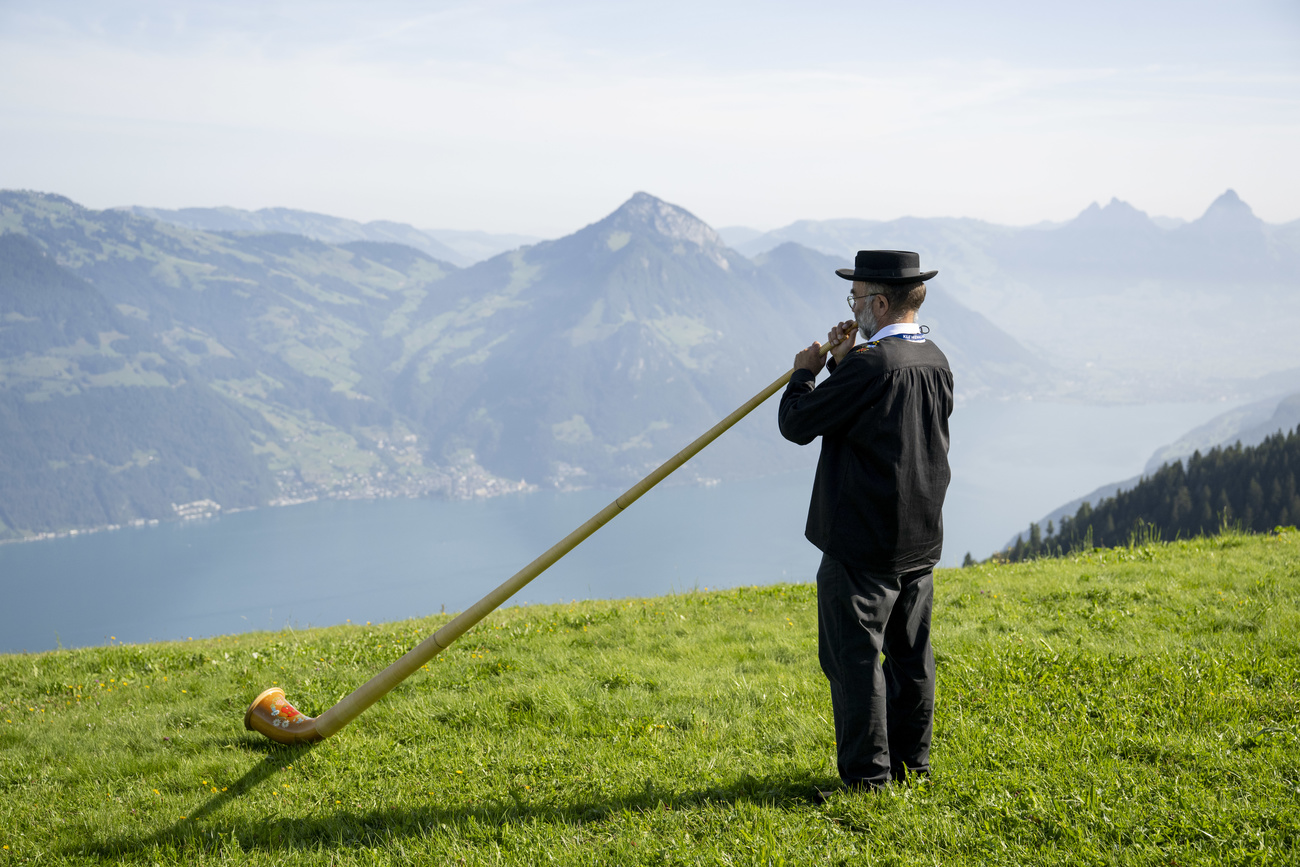
The Week in Switzerland
Dear Swiss Abroad,
I am pleased to bring you this week’s overview of the most important issues affecting Switzerland.
The residents of the village of Brienz-Brinzauls in canton Graubünden have no choice: they must leave their homes by Sunday at the latest and likely won’t be able to return for several months. This is due to a hazard looming atop the mountain—a huge mass of rock that has shifted dangerously since last year’s landslide, now forcing an evacuation of the entire village.
In today’s briefing, we also cover next week’s federal vote. On November 24, voters in Switzerland and abroad will cast their ballots on four key proposals. We also highlight a positive step forward for Swiss researchers from the European Commission, a study on smartphone addiction, and Switzerland’s improved ranking in digital competitiveness.
I hope you enjoy reading this edition!
The big stories of the week

All residents must leave Brienz-Brinzauls by 1pm on Sunday
The entire mountain village of Brienz-Brinzauls in canton Graubünden must be evacuated by Sunday, with residents likely displaced for several months. The village, part of the municipality of Albula, already faced an evacuation last summer following a huge landslide.
However, this year the situation is more severe. Last year a huge rockslide halted just above the village. But there is now an imminent danger that the massive rubble pile above Brienz could give way and rapidly descend toward the village, according to the Albula early warning service and the canton’s geology and natural hazards team.
The situation is especially challenging for farmers in the village, reports Swiss public television, SRF, as they must find places to house their animals. The problem is even more pressing in winter, when cattle cannot be moved to Alpine pastures.
- Read more about the difficult situation in our article here

Government and parliament face a likely ‘no’ for all vote proposals on November 24
With just under two weeks until the federal vote on November 24, a survey conducted by research institute gfs.bern, on behalf of SBC, swissinfo.ch’s parent company, has revealed that each of the four proposals on the ballot faces growing opposition. My colleague Katy Romy attended the survey presentation.
“For all four proposals that will be put to the vote on November 24, the proportion of ‘no’ votes has risen throughout the campaign,” Katy writes. This trend is unusual and differs from the typical pattern for government-backed proposals.
According to political scientist Lukas Golder from gfs.bern, this reflects a decline in public trust in both the government and parliament. “Trust is at its lowest level since 2018,” he notes. The poll suggests that the outcomes of all four proposals are likely to be close.
- Read the full article in English by my colleague Katy Romy

Swiss researchers welcome access to EU’s Horizon Europe scheme
The Swiss research community celebrated this week as Swiss researchers were granted eligibility to apply for new proposals under the European Union’s “Horizon Europe” programme from Wednesday.
The European Research Council has described this as a “clear sign” of goodwill from the European Commission in the ongoing negotiation process between the EU and Switzerland. However, agreements on any grants will only be valid if the association agreement between Switzerland and the EU is in place when the grants are issued.
“This opportunity to participate in the EU’s Horizon research programme offers Swiss researchers a unique chance to tap into commercial and social innovation,” said the State Secretariat for Education, Research and Innovation (SERI).
- Learn more about the European Commission’s decision at Nau.chExternal link (in German)
- Or read our English article about Horizon Europe

Switzerland climbs to third place in World Digital Competitiveness ranking
Switzerland has reached its highest-ever ranking in the World Digital Competitiveness Ranking, published on Thursday. It took second place globally, just behind Singapore and ahead of Denmark. Switzerland’s advancement is credited to strong high-tech exports, e-participation and cybersecurity.
The ranking, compiled by the World Competitiveness Centre, which is part of the International Institute for Management Development (IMD) in Lausanne, places Switzerland in the top 10 for seven of the nine areas it analyses.
However, Swiss news media Blick notes that there is still room for improvement, particularly in digital identity and the electronic medical record, both of which remain undeveloped in Switzerland.
- The article in BlickExternal link (in German)
- Or the article in External linkBlickExternal link (in French)

Study: 40% of Swiss show signs of smartphone addiction
A recent survey by Comparis, an online comparison portal, suggests that around 40% of Switzerland’s population exhibit clear signs of smartphone addiction.
Offering photos, contacts, messages and vast information, mobile phones have become indispensable. It’s no wonder many people find it difficult to go without them.
The term “nomophobia” refers to the fear of being without one’s phone (no-mobile phobia). In a survey of 1,050 respondents, Comparis found that nearly 40% struggle to go without their phones. In the 16-35 age group, this figure rises to 77%.
Interestingly, factors like gender, education level and income have little effect on addiction rates. However, urban residents show a much higher dependency than those in rural areas.
- Read the article from Swiss public television, SRFExternal link
- Or read our English article

The only truly authentic Swiss folk instrument
Only one genuine traditional Swiss instrument is recognised by musicologists—and it’s neither the alphorn nor the Schwyzerörgeli [accordion]. In fact, the only true Swiss folk instrument, originally from canton Appenzell Inner Rhodes, is a simple clay bowl.
Despite popular belief, the alphorn likely originated in Central Asia, and the Schwyzerörgeli, popular in Swiss folklore, comes from Austria. And while the hammered dulcimer [a percussion-stringed instrument] is often heard in Appenzell, it too is an Eastern European invention.
The unique Swiss folk instrument is a clay bowl that becomes musical when a five-franc coin is swirled inside it.
This is how “taler swinging” began—a pastime often accompanied by yodelling.
By the way, not all five-franc coins are suited for this!
Discover more about this Swiss invention in our
article

More
In search of the ‘authentic’ Swiss musical instrument
More
Picture of the week

A brass band on horseback marches in costume at the traditional Grand Cortège of the 553rd St Martin’s Festival, held on Tuesday, November 12, 2024, in Vevey, canton Vaud.

The week ahead
The campaign for the referendum on November 24 is likely to dominate the coming week in Switzerland, as four proposals are set for debate: the expansion of the motorway network, uniform financing of healthcare services, and two amendments to tenancy law.
The first bill seeks to address bottlenecks in the motorway network, expanding the A1 motorway to at least six lanes on certain sections between Bern and Zurich, as well as between Lausanne and Geneva.
The Health Insurance Act reform aims to promote outpatient treatment and reduce insurance premiums. It proposes a unified distribution formula across all three areas of basic insurance: outpatient, inpatient, and nursing care.
The final two bills concern tenancy law amendments. One proposal gives landlords more flexibility to regulate subletting, while the other addresses the conditions for personal use of a rented property. An optional referendum on all four legislative proposals is in place, allowing Swiss citizens, including those living abroad, to cast their votes on these issues.
Translated from German by Alexandra MV Andrist/sb

In compliance with the JTI standards
More: SWI swissinfo.ch certified by the Journalism Trust Initiative








